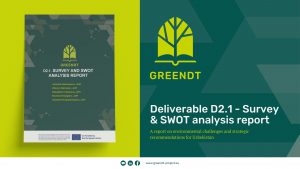
The GREENDT project has released Deliverable D2.1 – Survey and SWOT Analysis Report, which is now available on the project website. Developed under Work Package 2, led by Industry, the report provides an in-depth assessment of Uzbekistan’s most pressing environmental challenges and offers strategic recommendations to enhance education, innovation, and sustainability in the country.
The deliverable focuses on key environmental challenges emerging from Uzbekistan’s rapidly developing industrial sector, including air, water, and soil pollution, as well as waste management issues and the urgent need for energy efficiency and green transition. Within the framework of the GREENDT project, the report plays a crucial role in strengthening master’s-level education in environmental engineering and fostering stronger collaboration between academia and industry.
To prepare the report, the JizPI team conducted an extensive survey targeting higher education institutions (HEIs) and industrial enterprises. The questionnaire addressed topics such as environmental legislation, educational gaps, industry integration, skills requirements, and innovation opportunities. The collected data was complemented by a SWOT analysis of Uzbekistan’s current environmental policies and educational system.
The findings reveal both significant potential and critical challenges. While there is growing awareness of environmental protection laws and an increasing demand for master’s programmes in environmental engineering, the report identifies key weaknesses, including limited cooperation between universities and industries, insufficient research infrastructure, and a shortage of qualified professionals. Opportunities lie in developing joint programmes with European universities, integrating innovative teaching methods, and expanding practical training through laboratories and internships.
Based on these insights, the report proposes some recommendations, including:
- Strengthening collaboration between universities and industry.
- Enhancing practical and technical skills through modern teaching tools and laboratory work.
- Integrating European best practices into the local education system, including dual degree programmes.
- Improving systematic monitoring and quality assessment to align local standards with international frameworks.
The publication of Deliverable D2.1 represents an important milestone for the GREENDT project, offering valuable insights and practical recommendations to enhance environmental education and foster sustainable industrial development in Uzbekistan.
The full report is now available for download HERE!


